

MATCH GAME






Front Game Rules (1962-9 version) | ||
| Two teams of three players (each headed by a celebrity captain) competed. Host Rayburn would ask an open-ended question (Ex: "Name one word to describe Nikita Khrushchev"). The players each wrote down an answer, and when everyone was finished they revealed what they wrote down. If two members of the same team had the same answer, they scored 25 points. If all three teammates had the same answer, they scored 50 points. The first player to reach 100 points won the game. | 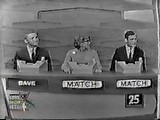
| |
Front Game Rules (1973-82 versions) | ||
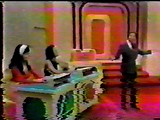
| Two players competed. Rayburn would read an open-ended statement (Ex: "At Fred's Barber Shop, if you tip him well, he'll part your hair with a nice, clean comb. If you don't tip him, he'll part your hair with a _____." A panel of six celebrities would write down their answers, and then the contestant would give his/her answer. Every time the player's answer matched the answer given by a celebrity, s/he scored a point. Two rounds were played, and celebrities who matched in the first round sat out the second round (making the maximum possible score 6 points). The player with the highest score after 2 rounds won the game and $100. (In the syndicated version, 3 rounds were played.) | 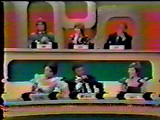
|
Front Game Rules (1990-1 version) | ||
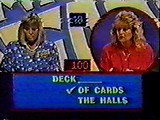
| Two players competed, with rules similar to the '70s version, although all celebrities took part in all rounds and matches were worth $50 each. After the first round, both players would take part in a "Match-up!" game, in which they picked a celebrity and tried to match as many quick phrases as possible (Ex: "Fog Bank/Horn") in 30 seconds, with each match worth $50. After the second round, a 45-second Match-up! round was played, with matches worth $100. Whoever had the most money at that point got to keep it and advanced to the bonus round. | |
Front Game Rules (1998-9 version) | ||
| Two players compete. This time, a panel of five celebrities wrote down answers that the contestants tried to match. In the first round, matches were worth 1 point each; in the second round, matches were worth 2 points. The player with the most points after two rounds won the game. | 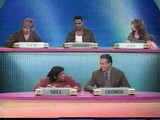
| |
End Game Rules (1962-9 version) | ||
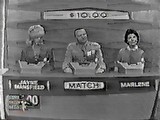
| Three more questions which were posed to a previous studio audience were asked to the team, and each player gave an answer. The team scored $50 for every match the team made with the audience's most popular answer. | |
Front Game Rules (1973-99 versions) - "Super Match" | ||
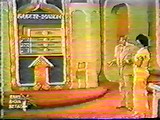
| The contestant was given a short incomplete phrase (Ex: "_____ Bridge") and tried to match the most popular answer given by a previous studio audience. The player could ask three of the celebrities for suggestions. Matching the most popular answer won $500, matching the second answer was $250, and the third answer was worth $100. In the '73-'79 network run, failing to match an answer ended the round, although in the syndicated show the player was spotted $50. | 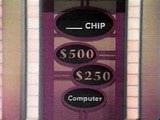
|
| In the second part of the bonus round, the player tried to match a celebrity of his/her choice with another incomplete phrase. If successful, s/he won ten times the amount s/he won in the Audience Match. Later on in the '70s run, and for the '90-1 run, a "Star Wheel" was brought in to randomly select the celebrity involved in the Head-to-Head match. There were also "Double" spots on the wheel, which doubled the potential value of the last question if the wheel landed on one of those spots. | 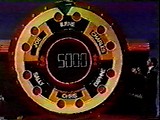 | |
Everyone admits it - this is not the strongest game concept in the world. Why, then, did this show succeed so well? Chemistry. The producers found just the right peanut gallery in Brett Somers, Charles Nelson Reilly and Richard Dawson. The 60's run was a staid affair, but the gameplay was perfected in the 70's. Sadly, I feel time has passed this show by; much of the humor was sparked through double entendre, and in the 90's people are just way too blatant to go for the subtleties.
|
|
|
|